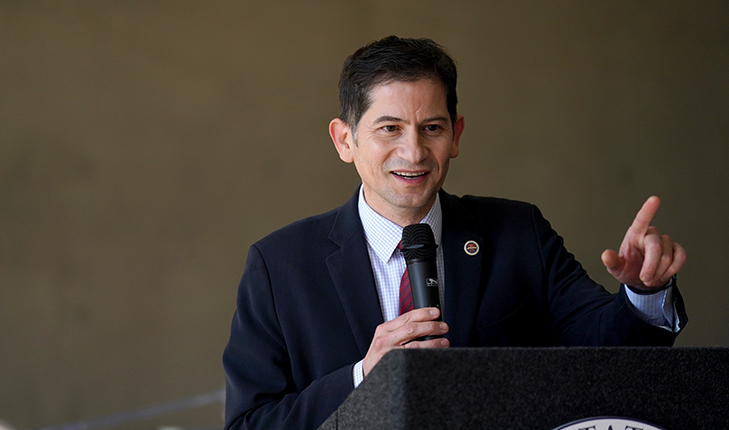University presidents have one official title, but many responsibilities — academic leader, strategist, fundraiser, communicator — and being the university’s biggest cheerleader.
An essential element of the president’s responsibilities involves elevating the brand and visibility of the university by highlighting the value of the institution. One of Fresno State President Saúl Jiménez-Sandoval’s main goals is to serve on local, state and national committees and commissions where he can do just that.
He serves as the co-chair on California State University committees for technology, financial stability and Black excellence, the latter of which is a committee that seeks to develop strategies to foster a welcoming and thriving environment for African American and Black students. The goal of the CSU is to become the champion of and the gold standard for fostering a sense of belonging and thriving.
He also sits on the American Association of State Colleges and Universities board of directors and other groups under the association. And there are many others.
In November, Jiménez-Sandoval was appointed to the USDA-HACU Leadership Group, a leading national committee that has direct collaborative sessions with the United States Department of Agriculture. With the Hispanic Association of Colleges and Universities, the group works to increase access to USDA programs and services in Hispanic communities. As the farm bill will be updated this year, this is a critical committee for the future of the region’s economy, Jiménez-Sandoval said.
About 25% of the nation’s food supply comes from the Central Valley region. When Fresno State is associated with that industry, it raises the university to a higher level of importance, Jiménez-Sandoval said. Agriculture, for example, is a specialized field that distinguishes Fresno State from other institutions, he said.
“The more visible we are to the federal government, the stronger chance we have in receiving the funding we need to get things done at Fresno State and to highly elevate student success,” Jiménez-Sandoval said. “The university is a strong institution when it is able to leverage its teaching resources combined with its research capability as well.”
For example, Fresno State’s Jordan College of Agricultural Sciences and Technology recently signed a memorandum of understanding with the U.S. Army Civil Affairs and Psychological Operations Command to formalize a decade-long collaboration. The Jordan College has helped educate military civil affairs officers to better understand local farming systems in regions of the world where they will deploy, better preparing them to identify and address global food insecurity challenges.
“Why did they come to us? Because they know the type of applied research we promote here — research that gives concrete results and that work,” Jiménez-Sandoval said.
In early 2022, Jiménez-Sandoval was appointed to the CSU Program for Education and Research in Biotechnology, a network of faculty, deans and presidents representing the system’s 23 campuses on biotechnology innovation and helping students embark on life science careers through experiential learning opportunities. This systemwide committee is instrumental in charting the path of innovation that will sustain the future of Fresno State and the CSU.
“My serving on systemwide and national boards provides me with a platform to vocalize the importance of Fresno State and the region to the State of California, the United States and our world,” he said.
From advocating for agriculture, to water for sustainable farming, to business, the health fields, arts and humanities, education and biotechnology, the more exposure Fresno State gets, the more “people will reach out to say, ‘can we collaborate?’” Jiménez-Sandoval said.





